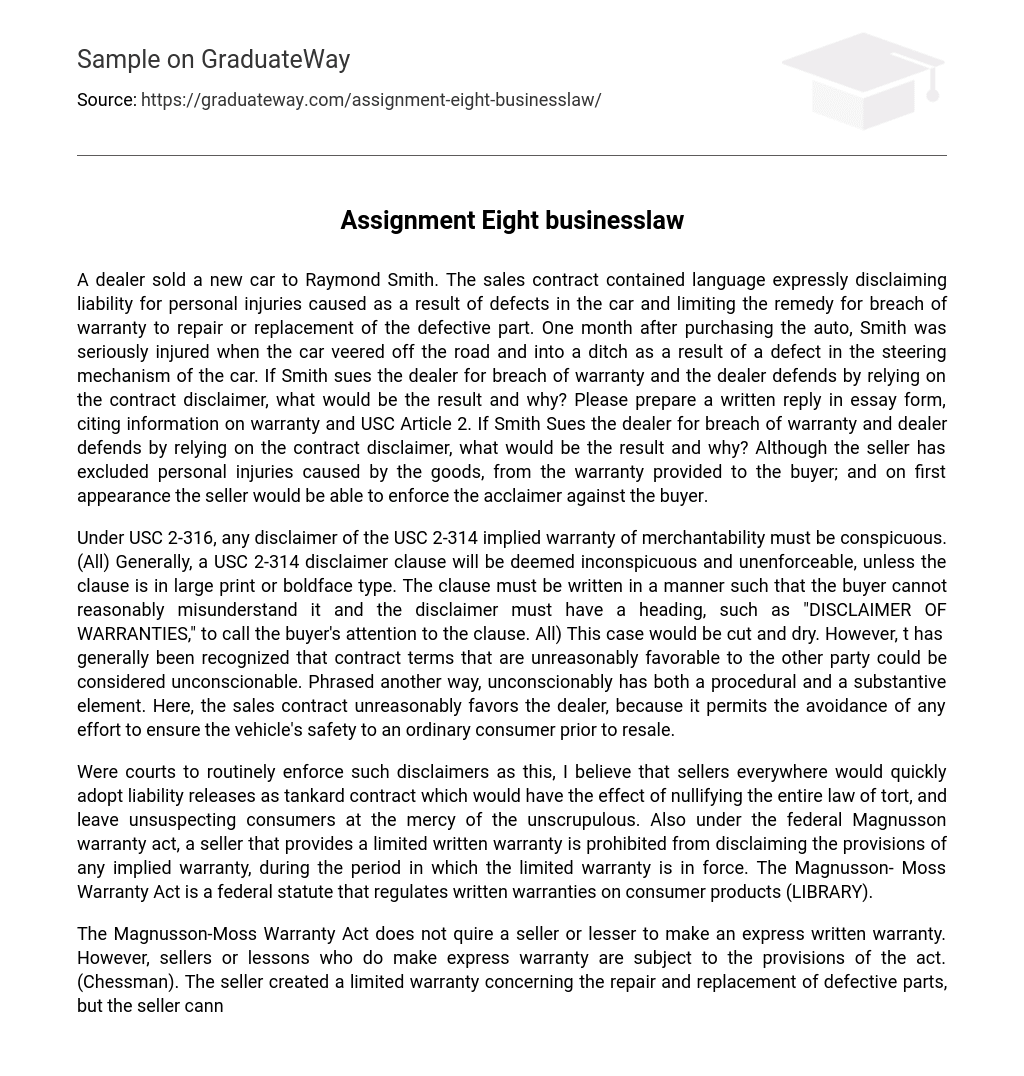A dealer sold a new car to Raymond Smith. The sales contract contained language expressly disclaiming liability for personal injuries caused as a result of defects in the car and limiting the remedy for breach of warranty to repair or replacement of the defective part. One month after purchasing the auto, Smith was seriously injured when the car veered off the road and into a ditch as a result of a defect in the steering mechanism of the car. If Smith sues the dealer for breach of warranty and the dealer defends by relying on the contract disclaimer, what would be the result and why? Please prepare a written reply in essay form, citing information on warranty and USC Article 2. If Smith Sues the dealer for breach of warranty and dealer defends by relying on the contract disclaimer, what would be the result and why? Although the seller has excluded personal injuries caused by the goods, from the warranty provided to the buyer; and on first appearance the seller would be able to enforce the acclaimer against the buyer.
Under USC 2-316, any disclaimer of the USC 2-314 implied warranty of merchantability must be conspicuous. (All) Generally, a USC 2-314 disclaimer clause will be deemed inconspicuous and unenforceable, unless the clause is in large print or boldface type. The clause must be written in a manner such that the buyer cannot reasonably misunderstand it and the disclaimer must have a heading, such as “DISCLAIMER OF WARRANTIES,” to call the buyer’s attention to the clause. All) This case would be cut and dry. However, t has generally been recognized that contract terms that are unreasonably favorable to the other party could be considered unconscionable. Phrased another way, unconscionably has both a procedural and a substantive element. Here, the sales contract unreasonably favors the dealer, because it permits the avoidance of any effort to ensure the vehicle’s safety to an ordinary consumer prior to resale.
Were courts to routinely enforce such disclaimers as this, I believe that sellers everywhere would quickly adopt liability releases as tankard contract which would have the effect of nullifying the entire law of tort, and leave unsuspecting consumers at the mercy of the unscrupulous. Also under the federal Magnusson warranty act, a seller that provides a limited written warranty is prohibited from disclaiming the provisions of any implied warranty, during the period in which the limited warranty is in force. The Magnusson- Moss Warranty Act is a federal statute that regulates written warranties on consumer products (LIBRARY).
The Magnusson-Moss Warranty Act does not quire a seller or lesser to make an express written warranty. However, sellers or lessons who do make express warranty are subject to the provisions of the act. (Chessman). The seller created a limited warranty concerning the repair and replacement of defective parts, but the seller cannot disclaim the implied warranty of USC 2-314, which requires that the vehicle be fit for the ordinary purposes for which the goods are used. The sales contract unreasonably favors the dealer, because it permits the avoidance of any effort to ensure the vehicle’s feet to an ordinary consumer prior to resale.
The buyer was simply driving the vehicle under ordinary conditions; and the seller’s personal injury disclaimer cannot be enforced against buyer. Therefore, as the vehicle defect renders it unfit for ordinary use, buyer will prevail against seller for breach of warranty. References Chessman, H. R. Business law, legal environment online commerce, business ethics, and international issues. Eight Edition. Mammal. Com/library/guides/FTC/ warranties/underarm. HTML Legal Information Institute (All) Law. Cornell. Deed.





